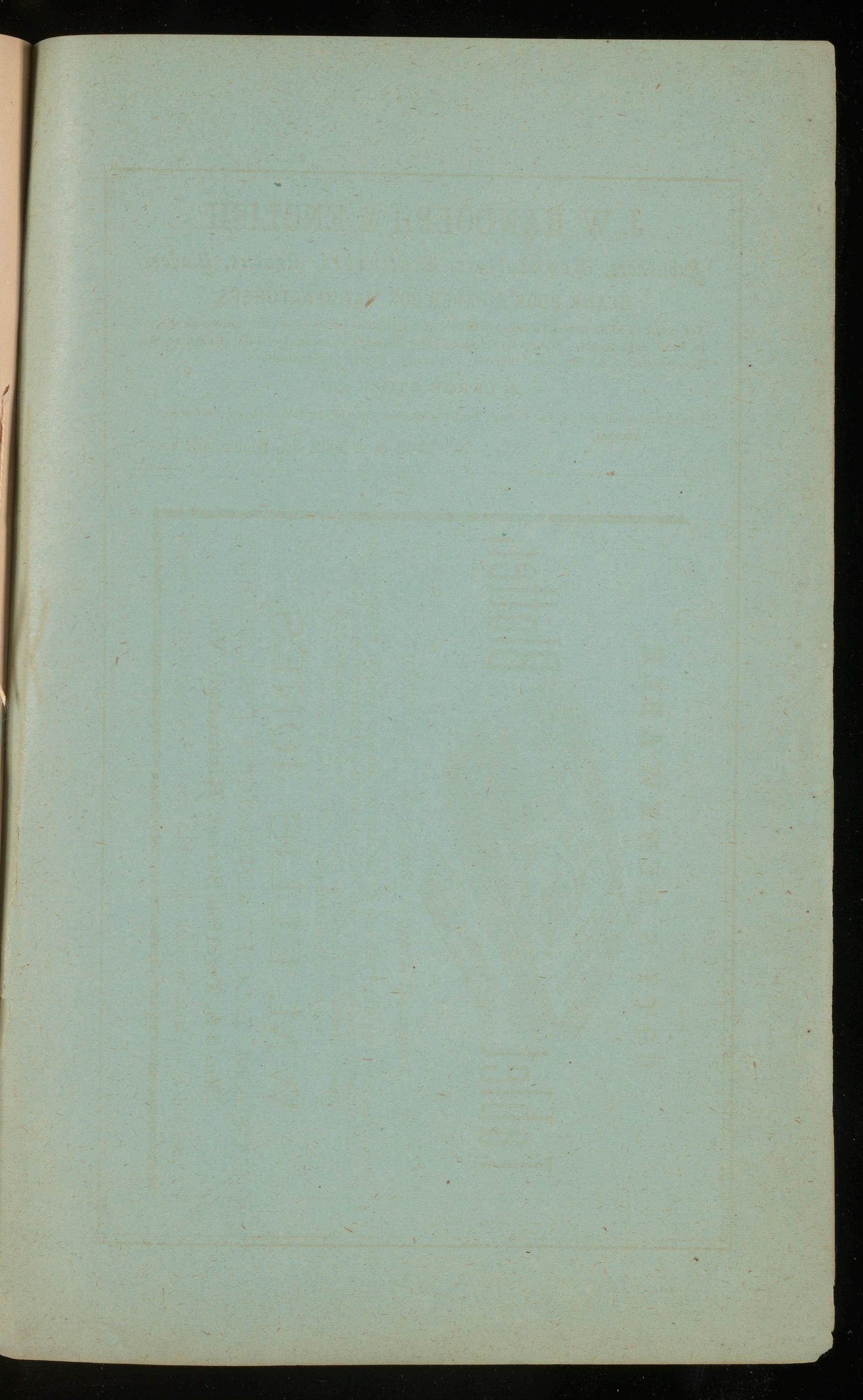CAT ALOG -UE.
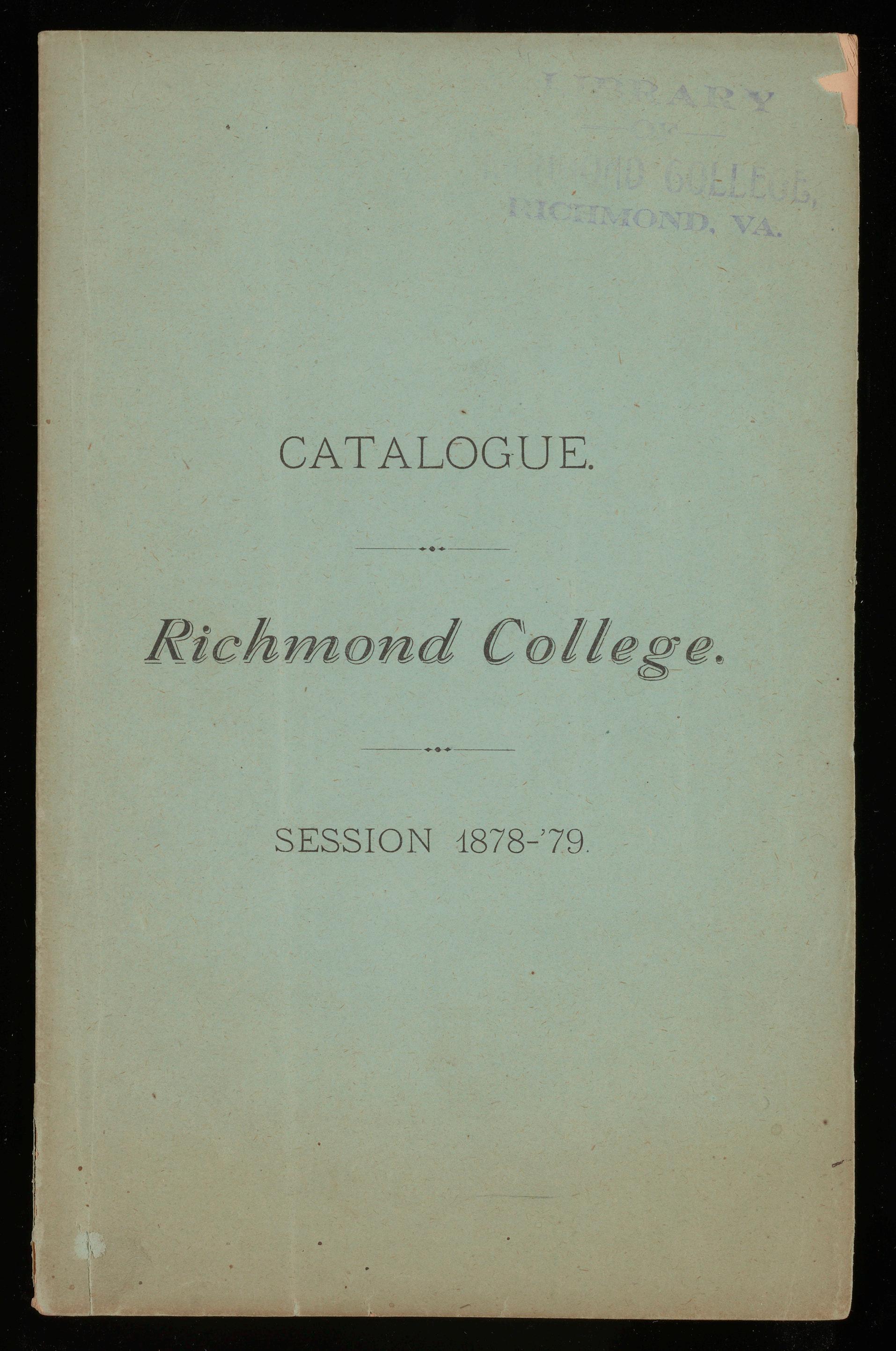
SESSION 1878-'79 .
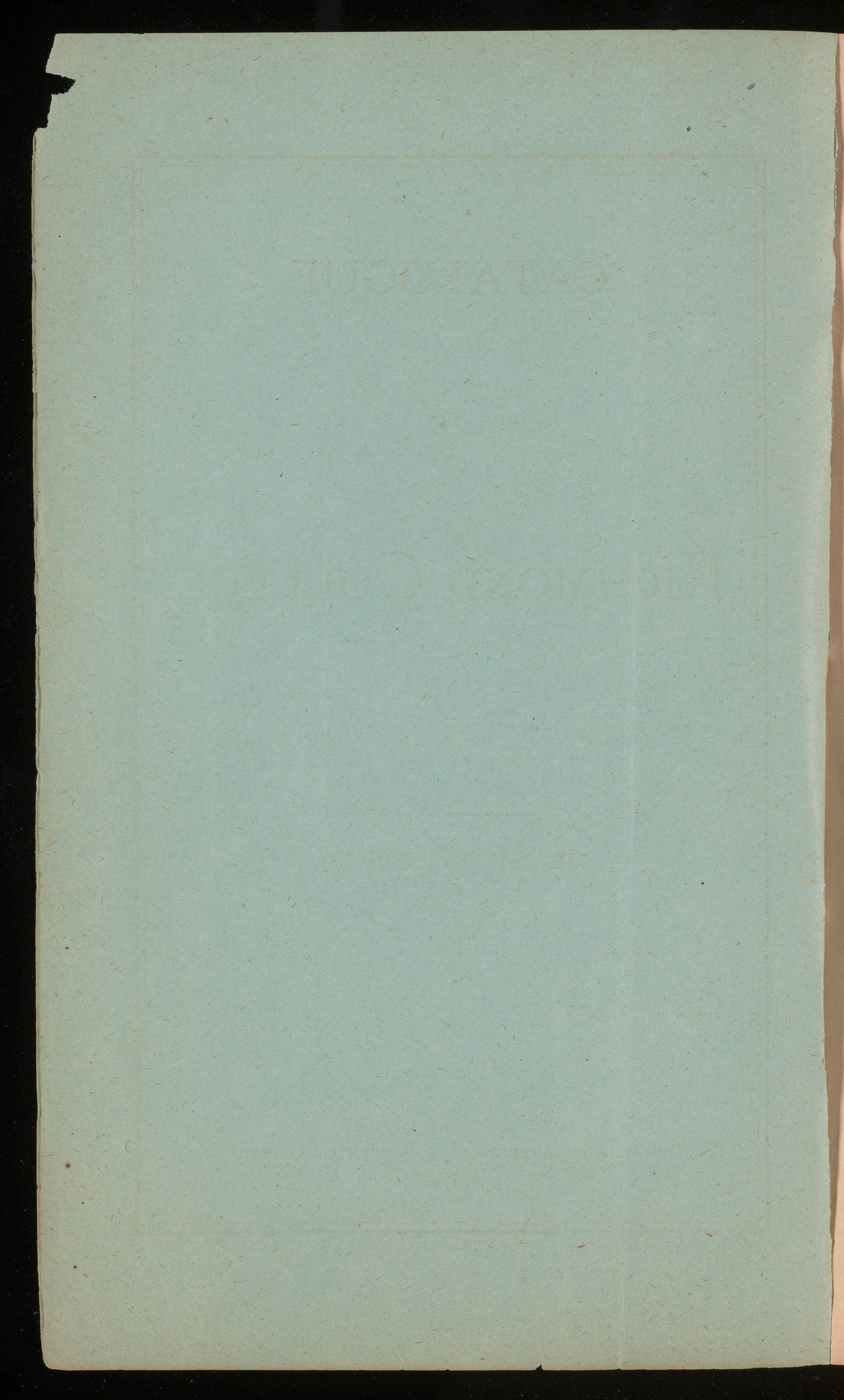


SESSION 1878-'79 .


SESSION 1878-'79.
RICHMOND: WM, ELLIS JONES, PRINTER, NO. 5 SOUTH TWELFTH STREET,

September 18th, -
February 3rd,
June 15th, -
June 16th and 17th,
June 17th, -
June 18th,Session begins.
Beginning of Second Half-Session. Meeting of Society of Alumni. Celebrations of the Literary Societies. Annual Meeting of Board of Trustees. Closing Exercises of the Session.
PRESIDENT,
J. B. JETER, D. D., Richmond.
FINANCIAL SECRETARY AND TREASURER,
Rev. C. H. RYLAND, Richmond.
J. B. Jeter, D. D., James Thomas, Jr., Esq.,
Col. Thomas J. Evans, Edwin Wortham, Esq.,
Rev. W. A. Baynham, John M. Murray, Esq.,
Richmond. John C. Williams, Esq., Richmond. W. D. Thomas, D. D., Richmond. C. C. Bitting, D. D., Richmond. J. R. Garlick, D. D., Essex Co. Richmond.
Rev. B. Grimsley, Rappahannock Co. Wellington Goddin, Esq., Richmond.
L. R. Spilman, Esq.,
Rev. A. H. Sands, Josiah Ryland, Esq.,
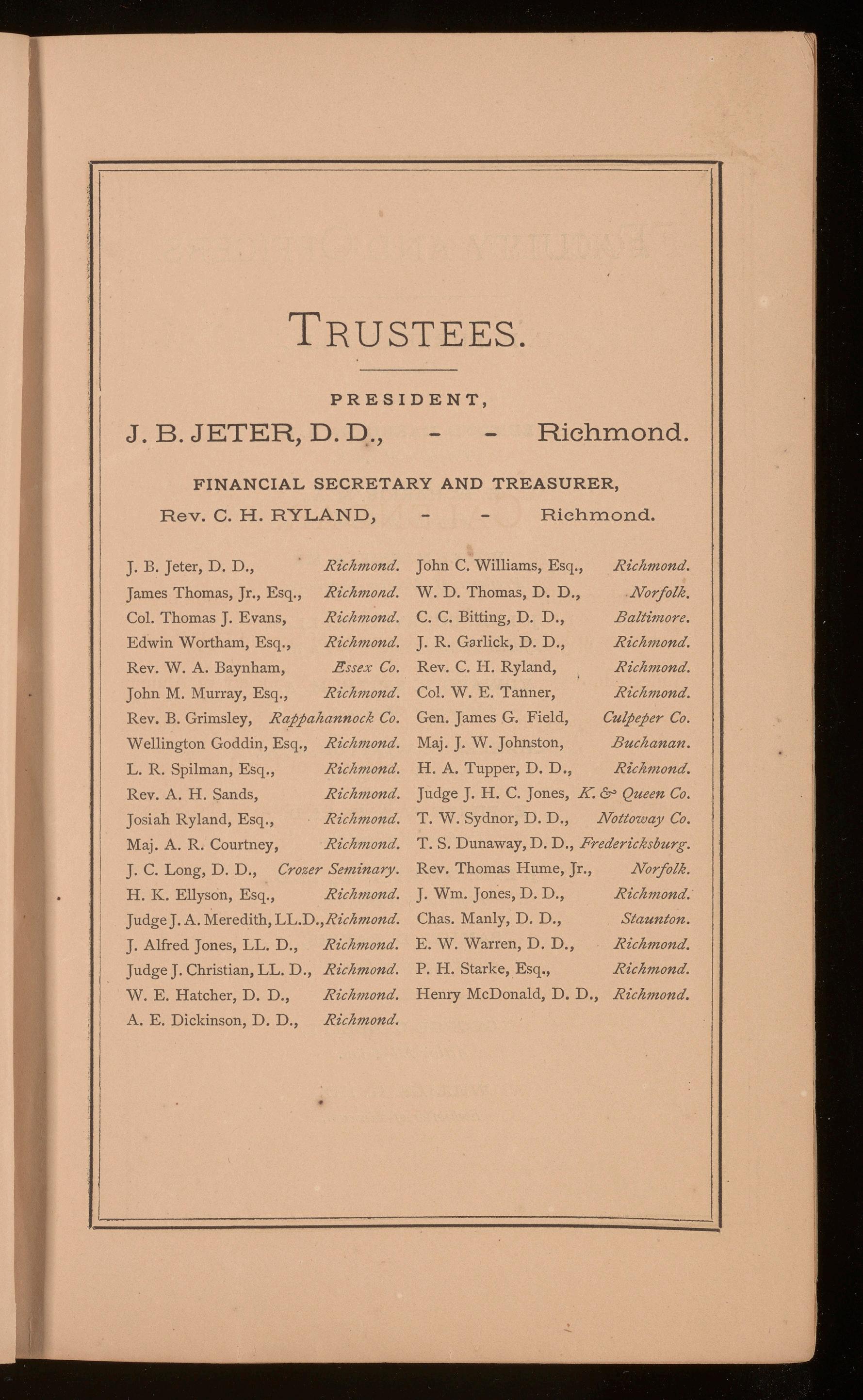
Rev. C. H. Ryland, Col. W. E. Tanner, Gen. James G. Field, Maj. J. W. Johnston, Richmond. Norfolk. Baltimore. Richmond. Richmond. Richmond. Culpeper Co. Buchanan.
Richmond. H. A. Tupper, D. D., Richmond. Richmond. Judge J. H. C. Jones, K. & Queen Co. Richmond. T. W . Sydnor, D. D., Nottoway Co. Maj. A. R. Courtney, Richmond.
J. C. Long, D. D., Crozer Seminary. H. K. Ellyson, Esq., Richmond.
Judge J. A. Meredith, LL.D.,Richmond.
T. S. Dunaway, D. D., Fredericksburg. Rev. Thomas Hume, Jr., Norfolk. J. Wm. Jones, D. D., Richmond. Chas. Manly, D. D., Staunton.
J. Alfred Jones, LL. D., Richmond. E. W. Warren, D. D.,
Judge J. Christian, LL. D., Richmond. P. H. Starke, Esq., Richmond. Richmond.
W. E. Hatcher, D. D., Richmond. Henry McDonald, D. D., Richmond.
A. E. Dickinson, D. D., Richmond.

B. PURYEAR, LL.D., Chairman.
EDMUND HARRISON, A. M., Professor of Latin.
H. H. HARRIS, M. A., Professor of Greek.
RODES MASSIE, A. M., Professor of Modern Languages.
J. L. M. CURRY, D. D., LL.D., J'ames Thomas Professor of English.
EDWARD B. SMITH, M. A., Professor of Mathematics,
CHARLES H. WINSTON, M.A., Professor of Physics.
B. PURYEAR, A. M., LL.D., Professor of Chemistry.
J. L. M. CURRY, D. D., LL.D., Professor of Philosophy.
SAMUEL D. DAVIES, Professor of Law.
GEORGE C. ABBITT, Acting Librarian.
WILLIAM G. HI~, Exhibitor of Museum.
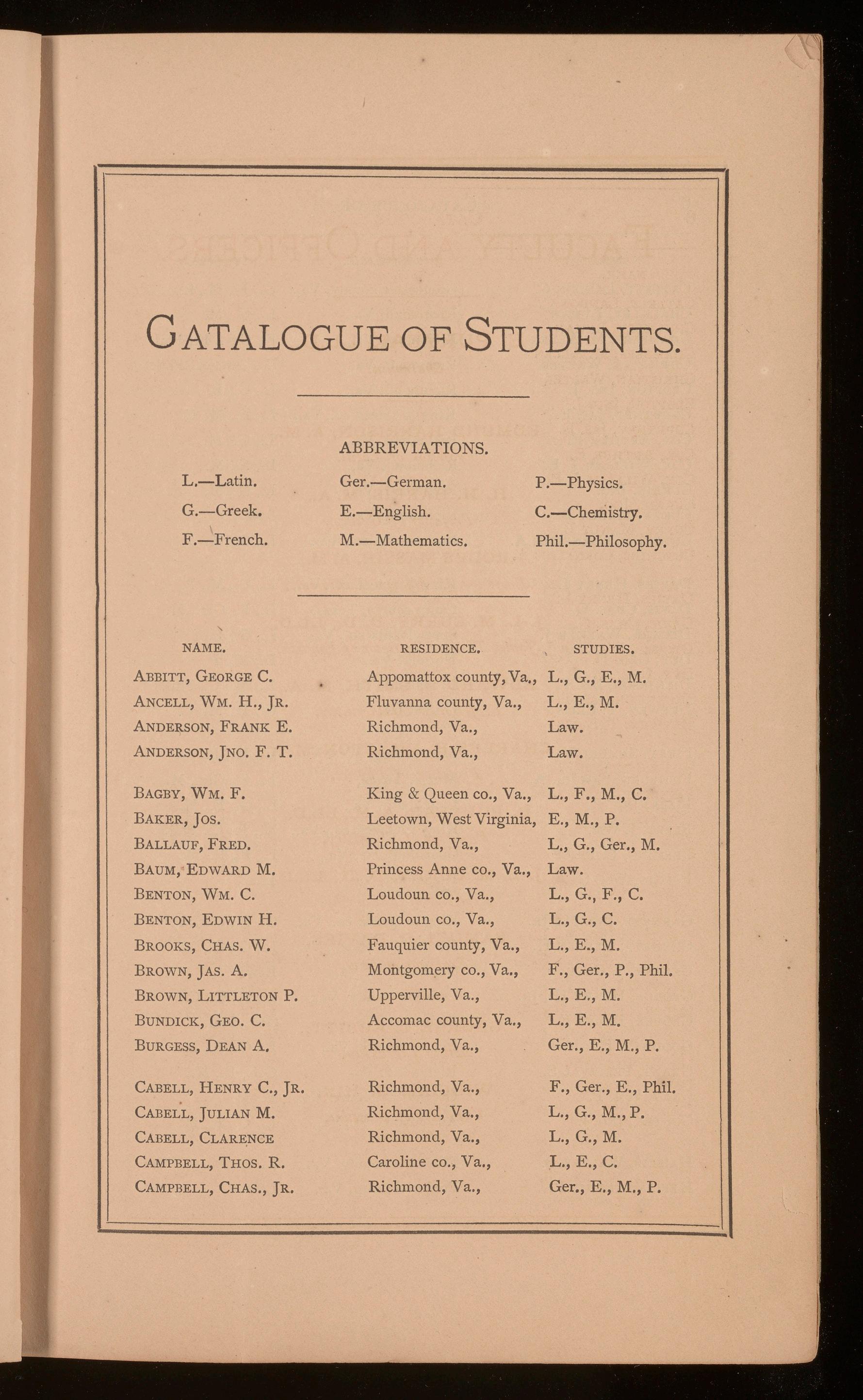
L.-Latin.
G.-Greek. F.-French. NAME.
ABBITT, GEORGEC. ANCELL,WM. H., JR. ANDERSON,FRANKE. ANDERSON,JNO. F. T.
BAGBY,WM. F. BAKER, Jos. BALLAUF,FRED.
BAUM,EDWARDM.
BENTON,WM. C.
BENTON,EDWIN H. BROOKS,CHAS. W. BROWN,JAS. A. BROWN,LITTLETONP. BUNDICK,GEO. C. BURGESS,DEAN A,
CABELL,HENRY C., JR.
CABELL,JULIAN M.
CABELL,CLARENCE
CAMPBELL,THOS. R. CAMPBELL,CHAS., JR,
ABBREVIATIONS.
Ger.-German.
E.-English. M.-Mathematics.
RESIDENCE. P.-Physics. C.-Chemistry. Phil.-Philosophy. STUDIES.
Appomattox county, Va., L.,G.,E.,M. Fluvanna county, Va., L., E., M. Richmond, Va., Law. Richmond, Va., Law.
King & Queen co., Va., L., F., M., C. Leetown, West Virginia, E.,M.,P. Richmond, Va., L., G., Ger., M.
Princess Anne co., Va., Law. Loudoun co., Va., L.,G.,F.,C. Loudoun co., Va., L., G., C. Fauquier county, Va., L.,E.,M. Montgomery co., Va., F., Ger., P., Phil. Upperville, Va., L., E., M. Accomac county, Va., L.,E.,M. Richmond, Va., Ger., E., M., P.
Richmond, Va., F., Ger., E., Phil. Richmond, Va., L.,G.,M.,P. Richmond, Va., L.,G.,M. Caroline co., Va., L.,E.,C. Richmond, Va., Ger., E., M., P.
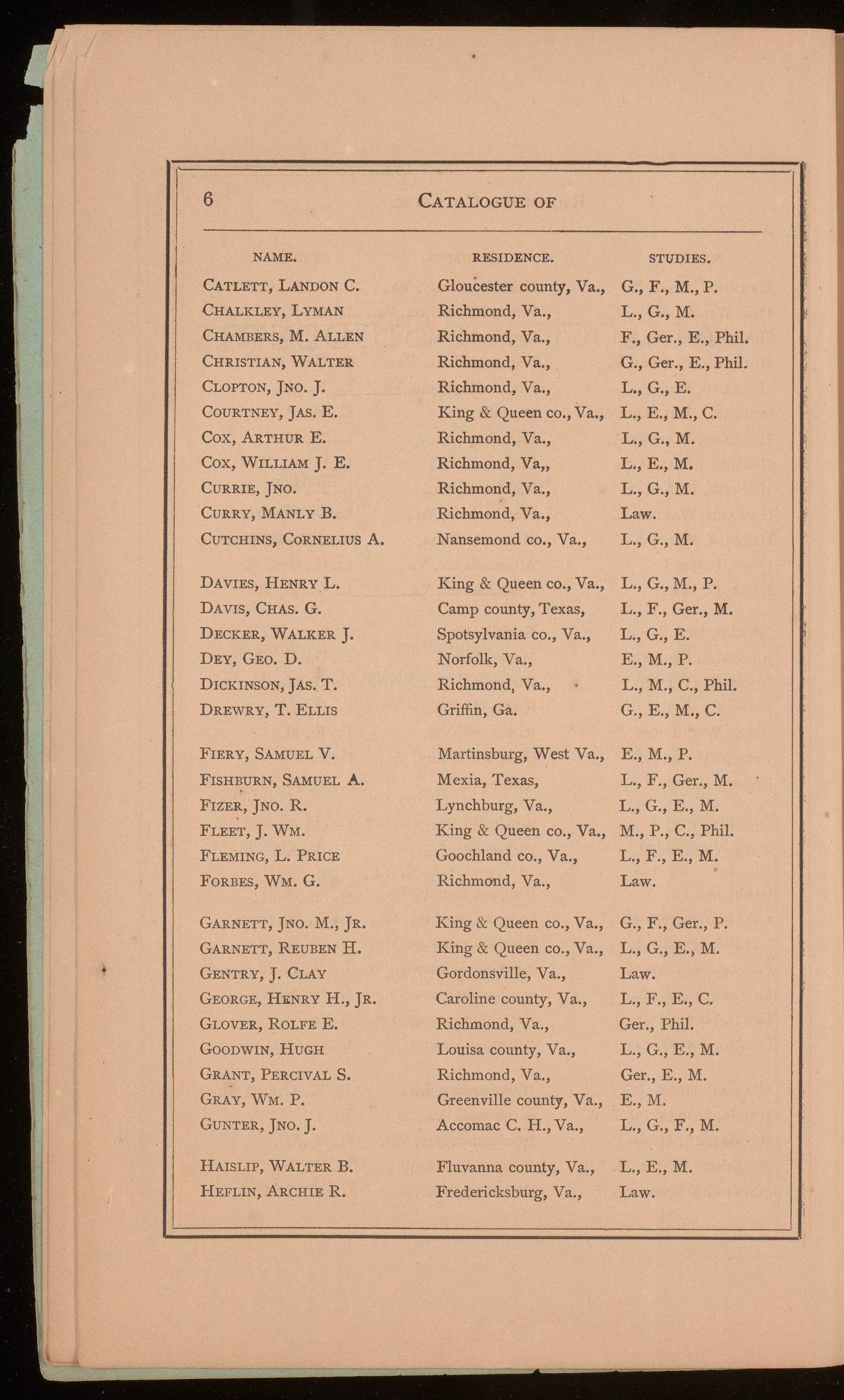
6
CATALOGUE OF NAME. RESIDENCE. STUDIES. CATLETT,LANDONC. Gloucester county, Va., G.,F.,M.,P.
CHALKLEY,LYMAN Richmond, Va., L.,G.,M. CHAMBERS,M. ALLEN Richmond, Va., F., Ger., E., Phil. CHRISTIAN,WALTER Richmond, Va., G., Ger., E., Phil. CLOPTON,JNO. J. Richmond, Va., L.,G.,E.
COURTNEY,JAS. E. King & Queen co., Va., L., E., M., C. Cox, ARTHUR E. Richmond, Va., L.,G.,M. Cox, WILLIAM J. E. Richmond, Va,, L.,E.,M. CURRIE,JNO. Richmond, Va., L., G., M.
CURRY,MANLYB. Richmond, Va., Law. CUTCHINS,CORNELIUSA. Nansemond co., Va., L.,G.,M.
DAVIES, HENRY L. King & Queen co., Va., L.,G.,M.,P.
DAVIS, CHAS. G. Camp county, Texas, L., F., Ger., M. DECKER, WALKER J. Spotsylvania co., Va., L.,G.,E. DEY, GEO. D. Norfolk, Va., E.,M.,P
DICKINSON,JAs.. T. Richmond, Va., L., M., C., Phil. DREWRY,T. ELLIS Griffin, Ga. G .,E.,M.,C. FIERY, SAMUELV. Martinsburg, West Va., E.,M.,P.
FISH~URN, SAMUELA. Mexia, Texas, L., F., Ger., M. FIZER, JNO. R. Lynchburg, Va., L.,G.,E.,M. FLEET, J. WM. King & Queen co., Va., M., P., C., Phil. FLEMING,L. PRICE Goochland co., Va., L., F., E., M. FORBES,WM. G. Richmond, Va., Law.
GARNETT,JNO. M., JR. King & Queen co., Va., G., F., Ger., P. GARNETT,REUBENH. King & Queen co., Va., L., G., E., M. GENTRY,J.CLAY Gordonsville, Va., Law.
GEORGE,HENRY H., JR. Caroline county, Va., L., F., E., C. GLOVER,ROLFE E. Richmond, Va., Ger., Phil. GOODWIN,HUGH Louisa county, Va., L., G., E., M. GRANT,PERCIVALS. Richmond, Va., Ger., E., M. GRAY,WM. P. Greenville county, Va., E.,M.
GUNTER,JNO. J. Accomac C.H., Va., L., G., F., M.
HAISLIP, WALTER B. Fluvanna county, Va., L., E., M. HEFLIN, ARCHIE R. Fredericksburg, Va., Law .

RICHMOND COLLEGE. 7
NAME. RESIDENCE. STUDI~.
HERNDON, CHAS. T. Fauquie~ county, Va., L., G., E., C., Phil. HIX, WM. G. Prince Edward co., Va., L.,G.,F.M. HOGE, MOSESD., JR. Richmond, Va., L., G., M. HoLLAND, EDWARD E. Nansemond co., Va., G., Ger., E., M., P. HOLLAND, WM. S. Isle of Wight co., Va., L.,E.,M. HOLLAND, WILLARD W, Danville, Va., E.,M.,P.,C. HOLLAND, WALTER A. Danville, Va., L.,E., M. HoLMES, J. LANDRUM Chefoo, China, L., G., F., M., C. HOPKINS, R. ASHBY Richmond, Va., L.,E.,M. HOWARD, WALLER L. Floyd county, Va., Law. HUDGINS, WM, T. Marshall, Texas, Ger., M., P., Phil. HUFF, LEWIS J. Albemarle co., Va., L., G., Ger., E. HURT, G. WM. Powhatan co., Va., L.,G.,E.,M.
JENKINS,JNO, B. Norfolk, Va., G., Ger., E., M. JOHNSTON,ROLAND Mexia, Texas, L.,G.,M.
JONES, CARTER H. Richmond, Va., L., G., M., C. JONES, CHAS. E. Richmond, Va., F.,P., C. JONES, WM. ASHBY Richmond, Va., L., E., M. JONES, SAMUELD. Campbell county, Va., L.,Law. JOYNES,LEVIN Richmond, Va., L., F., M.,C.
KIRTLEY, J. S. Petersburg, Ky., L., G., E., Phil: KNOX, CONWAYM. Richmond, Va., L., G., M.
LAKE, JAS. L. Fauquier county, Va., L.,G.,M. LATANE,ROBERT H. King & Queen co., Va., L., F., M., C. LATANE, HARRY A. King & Queen co., Va., L., G., E., M. LAWRENCE,Tuos. J. Nansemond county, Va., L., G., F., M. LAWRENCE,JNo. L. Southampton co., Va., L.,G., M. LEWIS, HERBERT J. King Wm. county, Va., L: v. LOVING,ANDREW G. Albemarle county, Va. L.,G.,C.
MAY, AUGUSTUS New Orleans, La., L.,E.,P.,C. MARYE, LITTLETON_T. W. Richmond, Va., Law. McCORMICK, HUGH P. Loudoun county, Va., L., G., F. MCMANAWAY,JAS. M. Bedford county, Va., L., G., Ger., E. MERCER, I. MORTON Richmond, Va., G., M., P., Phil.
8
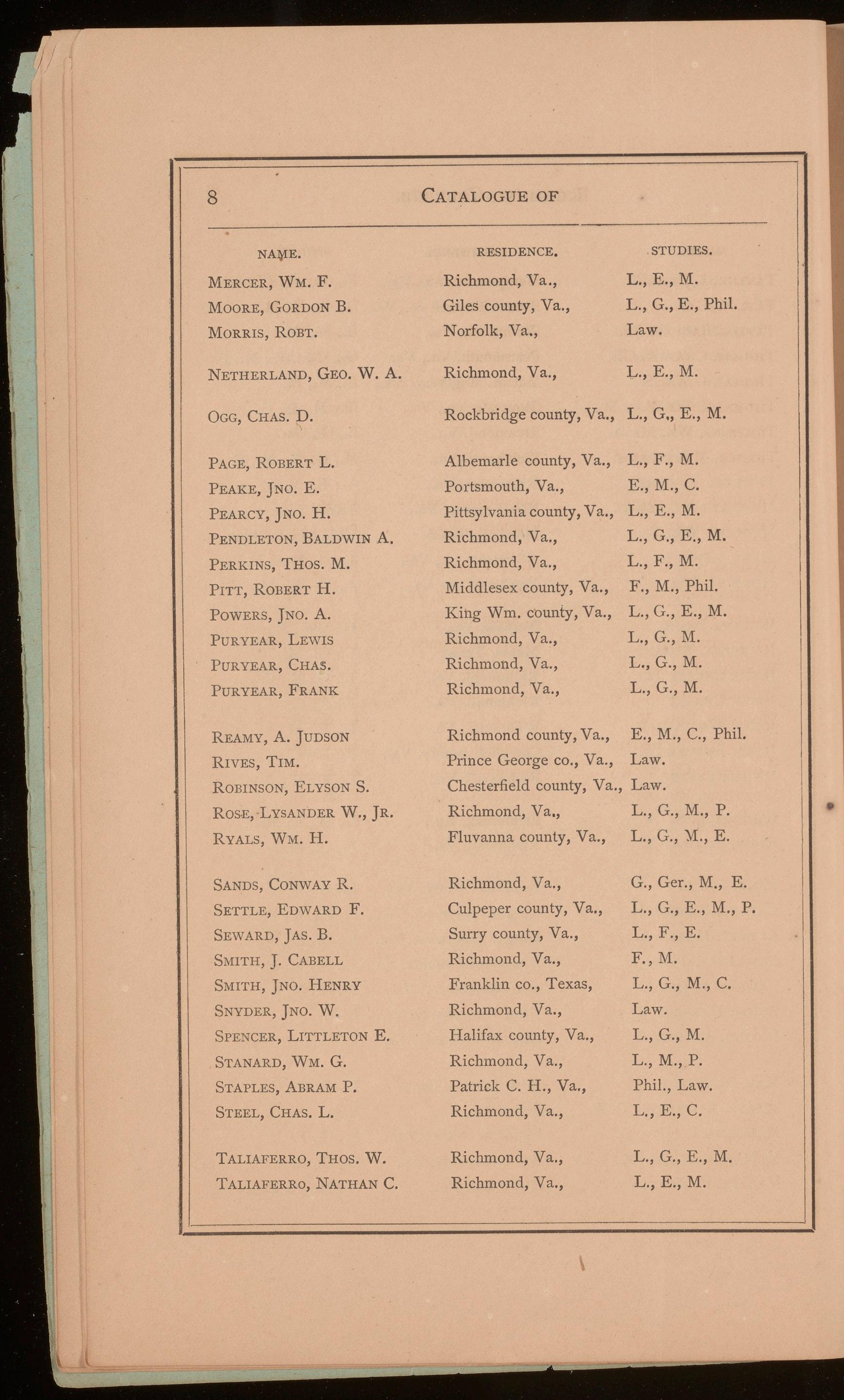
CATALOGUE OF
NA¥E. RESIDENCE, STUDIES. MERCER, WM. F. Richmond, Va., L.,E.,M.
MOORE, GORDONB. Giles county, Va., L., G., E., Phil. MORRIS, ROBT. Norfolk, Va., Law.
NETHERLAND,GEO. W.A. Richmond, Va., L., E., M.
OGG, CHAS. D. Rockbridge county, Va., L., G., E., M.
PAGE, ROBERT L. Albemarle county, Va., L., F., M.
PEAKE, JNO. E. Portsmouth, Va., E.,M.,C.
PEARCY,JNO. H. Pittsylvania county, Va., L.,E.,M. PENDLETON,BALDWINA. Richmond, Va., L., G., E., M. PERKINS, THOS. M. Richmond, Va., L., F., M.
PITT, ROBERT H. Middlesex county, Va., F.,M.,Phil. POWERS, JNO. A. King Wm. county, Va., L., G., E., M. PURYEAR, LEWIS Richmond, Va., L., G., M. PURYEAR, CHAS. Richmond, Va., L.,G., M. PURYEAR,FRANK Richmond, Va., L., G., M.
REAMY, A. JUDSON Richmond county, Va., E., M., C., Phil. RIVES, TIM. Prince George co., Va., Law. ROBINSON,ELYSONS. Chesterfield county, Va., Law. ROS.E,LYSANDERW., JR. Richmond, Va,, L., G., M., P. RYALS, WM. H. Fluvanna county, Va., L., G., 'M., E.
SANDS, CONWAYR. Richmond, Va., G., Ger., M., E. SETTLE, EDWARD F. Culpeper county, Va., L., G., E., M., P. SEWARD,JAS. B. Surry county, Va., L., F., E. S~UTH, J. CABELL Richmond, Va., F.,M.
SMITH, JNO. HENRY Franklin co., Texas, L., G., M.,C. SNYDER,JNO. W. Richmond, Va., Law. SPENCER,LITTLETON E. Halifax county, Va., L.,G.,M. STANARD,WM. G. Richmond, Va., L., M., P. STAPLES,ABRAMP. Patrick C. H., Va., Phil., Law.
STEEL, CHAS. L. Richmond, Va., L.,E.,C.
TALIAFERRO,THOS. W. Richmond, Va., L., G., E., M. TALIAFERRO,NATHAN C. Richmond, Va., L., E., M.

RICHMOND COLLEGE. 9
NAME. RESIDENCE. STUDIES.
TAYLOR,J. JUDSON Henry county, Va., F., Ger., M., P. TAYLOR, GEO. B., JR. Rome, Italy, L.,G.,E.,M. TAYLOR, JAQUELINP. Richmond, Va., L., F., E., M. THOMAS,CHAS. A. G. Portsmouth, Va., G.,M.,C. THOMAS,GEO. E. Martinsburg, W. Va., E.,M.,P. THOMAS,CHAS. E. Gloucester co., Va., Law. TOMPKINS,WM. M. Richmond, Va. L., G., Ger. TURNER, MORTIMERA. Richmond, Va., M.,Law.
VAUGHAN,WM. A. Rockingham co., Va., L., G., E. VEST, RICHARDS. Richmond, Va., F.,E.,C.
WASHINGTON,WALKER,JR. Fredericksburg, Va., L.,F.,M. WASHINGTON,RICHARD Fredericksburg, Va., L., F., E., M. WHITE, JNO. 0. Albemarle county, Va., L.,F.,M. WIATT, JNO. E. Gloucester county, Va., L., G., M., P. WINFREE, ROBERT H. Manchester, Va., L., G., M. WINFREY, ELISHA W. Buckingham co., Va., L., G., C. WOODSON,EDW. V. Fincastle, Va., L., G., M. • WOOLFOLK,PICHEGRU Richmond, Va., L.,E.,M. WORTHAM,CHAS. E., JR. Richmond, Va., F.,E.,M. WORTHAM,ROBERT 0. Hanover C. H., L.,E., M. WRIGHT, JAS. H. Richmond, Va., L., G., E., M.

• Latin,Greek,French, German, English, Virginia, Texas, West Virginia, Georgia, Kentucky, Louisiana, China, Italy,

Location.
The city of Richmond, along with its great natural beauty and rapidly increasing importance as a commercial, manufacturing, political and religious centre combines the pre-eminent advantages of physical and moral healthfulness. Its easy accessibility, favorable climate, good society and many aids and stimulants to mental culture, make it one of the best, if not the very best location in the South for an institution of learning. Situated on hills opposite the falls of the James, it is afflicted neither with the malarial fevers of tide-water, nor with the pulmonary diseases of the mountain region. For religious advantages, and wholesome moral tone, a more excellent community can nowhere be found.
Young men who have already contracted vicious habits, or are predisposed to dissipation will, of course, find temptations here as everywhere else, but it is confidently claimed, and supported by long experience, that all whose age and character qualify them to enter college at all, are comparatively safe under the restraining and ennobling influences of a distinctly Christian college m an exceptionally Christian city.
Grounds and Buildings.
The College premises embrace about eighteen acres, just within the corporate limits, and in a portion of the city, which, on account of its natural beauty and elevation, is aevoted mainly to

CATALOGUE OF
private residences, and is improviog more rapidly than any other. The centre building, a large and beautiful edifice, occupies a commanding site, and fronts directly down Grace street from its {vestern terminus. It contains a chapel, lecture-rooms, society halls, library, museum and some dormitories. Of the wings, designed maihly for dormitories, only one has yet been erected, but this, with cottages and other buildings on the premises, will furnish ample accommodation for two hundred and fifty students or more. The other wing will be built as soon as the increase of numbers requires it. The dormitories and public rooms are well ventilated, supplied with gas, and warmed by a steam-heating apparatus, the most approved for safety, comfort and healthfulness.
Faculty.
The Faculty of instruction and government consists of coequal Professors, one of whom is annually chosen to be their Chairman and chief executive officer. To them, as a body, is committed all that pertains to the discipline and interior management of the Institution, while each Professor is responsible for the efficient conduct of his own School.
The College is composed of eight independent Academic schools, and a School of Law.
The advantages of this system are numerous. Among them the following deserve attention: The professor feels the full force both of individual duty and of personal ambition; the course of instruction can be readily enlarged or altered to adapt it to the progress of science and to the varying wants of the times ; the student, whose aims or preparation require, can select a course suited to his peculiar case; he can enter, in any department of study, the classes for which he is prepared, and deficiency in one branch does not retard him in another; students are not divided into fixed classes and grades, but all stand on a footing of social equality, and mingle freely with one another; the whole system favors the utmost thoroughness of culture, even at the expense of less extensiveness in superficial attainments; the degrees, being awarded to fewer persons than under a curriculum, are therefore of more value; and every good student, whether he takes a degree or not,

receives a testimonial to his success, in the shape of Certificates or School Diplomas.
The session begins on the 18th September, and continues for nine months.
Students will be received at any time during the session, but are earnestly recommended to enter promptly at the beginning, and thus avoid the serious disad".antage occasioned by absence from the classes at that important period.
Every applicant for admission, upon his arrival at the College, shall report promptly to the Chairman of the Faculty. If he has been a student at any other incorporated Institution, he must present satisfactory evidence of general good conduct while there. His course of study having been arranged, he will receive a permit to matriculate, upon presentation of which to the treasurer, and payment of the required fees, his name will be placed on the rolls.
Each student, under the advice of the Faculty, may select such studies as are most important in qualifying him for his future pursuits; but while allowing such selection, the Faculty will always encourage a regular and complete course, and to this end reserve the right to prescribe the studies to be pursued by all who shall be found unprepared for classes higher than the Junior in any two of the schools of Latin, English and Mathematics.
Every student is required to attend at least thrne schools, and to adhere throughout the session to the studies selected on his matriculation, unless the Faculty, for satisfactory reasons, allow him to attend a less number or to make an exchange.
Students are assigned to the several classes in a school according to their apparent attainments; but the Professor will be at liberty at any time to transfer a student to a higher or lower class, if it be found desirable.
The lower classes in several schools are divided into sections, in order to secure satisfactory classification of students, and by
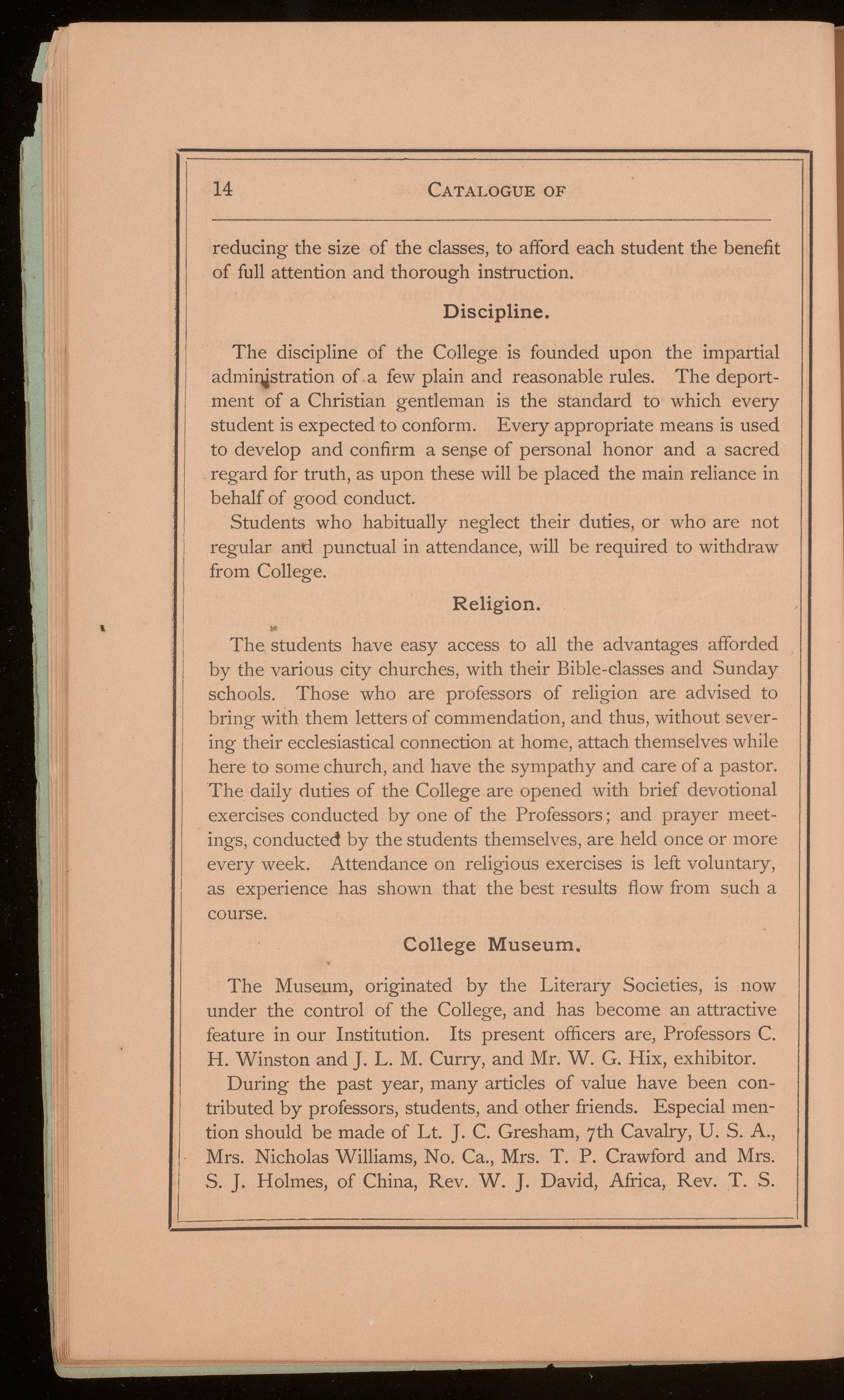
CATALOGUE OF
red u cing the size of the classes, to afford each student the benefit of full attention and thorough instruction.
Disci p lin e .
The discipline of the College is founded upon the impartial admilljstration of a few plain and reasonable rules. The deportment of a Christian gentleman is the standard to which every student is expected to conform. Every appropriate means is used to develop and confirm a sense of personal honor and a sacred regard for truth, as upon these will be placed the main reliance in behalf of good conduct.
Students who habitually neglect their duties, or who are not regular and punctual in attendance, will be required to withdraw from College.
Religion.
The students have easy access to all the advantages afforded by the various city churches, with their Bible-classes and Sunday schools. Those who are professors of religion are advised to bring with them letters of commendation, and thus, without severing their ecclesiastical connection at home, attach themselves while here to some church, and have the sympathy and care of a pastor. The daily duties of the College are opened with brief devotional exercises conducted by one of the Professors; and prayer meetings, conducted by the students themselves, are held once or more every week. Attendance on religious exercises is left voluntary, as experience has shown that the best results flow from such a course.
College Museum.
The Museum, originated by the Literary Societies, is now under the control of the College, and has become an attractive feature in our Institution. Its present officers are, Professors C. H. Winston and J. L. M. Curry, and Mr. W. G. Hix, exhibitor.
During the past year, many articles of value have been contributed by professors, students, and other friends. Especial mention should be made of Lt. J.C. Gresham, 7th Cavalry, U. S. A., Mrs. Nicholas Williams, No. Ca., Mrs. T. P. Crawford and Mrs. S. J. Holmes, of China, Rev. W. J. David, Africa, Rev. T. S.

Dunaway, D. D., Miss Pender, Mr. J. T. Sutton, Mr. John J. Clopton, Mr. J. S. Cobb, Mr. W. C. Bland, Mr. J. J. Hopkins, Mr. Micou, of Tappahannock, and Col. William Townes, Sr., of Mecklenburg.
Contributions of minerals, Indian relics, or of any thing rare, valuable, or of historic or archreologic interest are solicited. The expenses of transmission, when desired, will be paid. • Library.
The College Library contains over 5,000 volumes. During the present session, improvements have been made in the Libraryroom, increasing the facilities for safe-keeping of the books. Since the issue of the last catalogue, many valuable additions have been made, by purchase and contribution, among which may be named: Latin Hymns; Tertullian; Athenagoras; Eusebius; Justin Martyr; a number of volumes of Bohn's Antiquarian and Historical Libraries; Essays in Criticism (Arnold); Sheridan's Dramatic Works; Recollections of Writers (Charles and Mary Cowden Clarke); Revised Statutes of the United States; Astronomical and Meteorological Observations; Congressional Record and many other Public Documents.
The thanks of the College are due and tendered to Hon. G. C. Walker, Hon. John T. Harris and General R. L. T. Beale, for the last-named ~ontributions.
The Reading Room is regularly supplied with daily papers from all parts of the country, and with the Standard Magazines and Reviews. To this every student has free access. It has been greatly enlarged and otherwise improved during the present session.

I. School of Latin. Professor Harrison.
In this school are taught the Latin Language and Literature, and Roman History.
The course of study is indicated by the text-books used in the several classes.
JUNIOR CLASS.-Section first is designed for students prepared to begin to read the Latin authors; section second, for students of a higher grade.
Text-Books Section I.-Ccesar (Chase and Stuart's), Bingham's Latin Grammar. Section IL-Virgil, Cicero's Orations (Chase and Stuart's), Sallust (Long's), Bingham's Grammar. For reference: Baird's Classical Manual.
This class recites daily, and is persistently drilled in the Forms and Syntax of the language, with due attention to quantity.
INTERMEDIATECLASS.-Cicero de Senectute et de Amicitia (Long's), Horace (Macleane's), Livy (Chase and Stuart's), Gildersleeve's Latin Grammar (last edition), selected exercises.
SENIOR CLASs.-Cicero, Ep. ad Div., Cic. de Oratore, Terence (Fleckheisen's), Juvenal (Leverett's), Tacitus, original exercises. For reference: Zumpt's and Gildersleeve's Grammars, Andrews' Latin Lexicon, Anthon's Classical Dictionary.
ROMANHISTORY.-Merivale's; Long's Ancient Atlas.
Throughout the course the student's progress is tested, and his powers of analysis and composition cultivated by exercises in rendering English into Latin and Latin into English.
As subsidiary to this school, and to meet the wants of such students as cannot enter to advantage the Junior Class, there is a Gra~mar Class, wherein the Forms are studied until they are mastered.
Text-Book: Gildersleeve's Primer and Reader.

Pro.fessor Harris.
The studies in this school embrace the forms and structure of the language, and an introduction to the history and literature of the ancient Greeks.
The first section of the Junior Class begins with the alphabet, and has daily drill, with constant exercise in writing and frequent reviews, to secure a ready familiarity with the common inflexions. The second section gives two days a week to grammar, three to translating. The Intermediate Class is occupied mainly in reading several Attic authors. The Senior Class takes up some of the more difficult classics, reviews the grammar, with special attention to its general principles, and surveys the history, literature and art of the Gre eks.
Written exercises, translations of English into Greek or vice versa, are required, at least, once a week in every class. The aim throughout the course is twofold: first, to develope habits of minute attention and nice discrimination, secondly, to cultivate an appreciation of the many excellencies of Hellenic genius. Graduates and members of the Senior Class will have opportunity to join a class to read once a week the New Testament in the original.
TEXT-BOOKS.
Junior Class: SECTION r.-McClintock and Crooks' or Harkness' First Book in Greek. Xenophon's Anabasis (Kendrick's Edition). SECTION2. Hadley's Elements, Jones' Prose Composition, Xenophon's Anabasis, Lysias (Stevens' Edition)
Intermediate Class.-Hadley's Grammar, Sidgwick's Prose Composition, Lysias, Euripides, Sophocles, Herodotus.
Senior Class.-Curtius' Grammar, Goodwin's Moods and Tenses, Smith's History of Greece, Homer, Plato, Thucydides.
New 'Testament Class.-Tischendorf's Novum Testamentum Graece.
For reference in all classes, Liddell and Scott's Lexicon, Yonge's or Hamilton's English-Greek Lexicon and Smith's Classical Dictionary. 2

3. School of Modern Languages, Professor Massie.
In this school are embraced the French and the German. There are two classes, Junior and Senior, in each language. The Junior classes are thoroughly drilled in the etymological forms, and are practiced in the simpler principles of syntax. The aim in the Senior Classes is to acquire critical accuracy and facile elegance of translation. Frequent exercises are required of all the classes. ·
Besides the regular course of reading in the class-room, extensive auxiliary courses are prescribed for the Senior Classes. TEXT-BOOKS.
FRENCH. Junior Class.-Otto's Grammar, De Fivas' Classic French Reader.
Senior Class.-Otto's Grammar, supplemented by lectures; Joynes' French Plays; and selections, varied from year to year, from standard authors. Spiers and Surenne's Dictionary.
GERMAN. Junior Class.-Otto's Grammar, Whitney's Reader.
Senior Class.-Otto's Grammar, with lectures ; Whitney's Reader; and varied selections from standard authors. Adler's Dictionary.
4. School of English. Professor Curry.
The studies of this school embrace the origin, growth, grammatical structure and philological peculiarities of the language, Rhetoric and History. Exercises in composition are frequent, to give habits of self-criticism and the ready use of pure English.
The lives of the most eminent English and American writers are studied with critical readings of some of their productions.
JUNIOR CLASs.-Greene's Analysis, Abbott's How to Write Clearly, Swinton's Word Analysis, Hart's Rhetoric.
INTERMEDIATE CLASS.-Angus' Handbook of the English Language, Morris' Outlines of English Accidence, Gilmore's Art of Expression, Hill's Rhetoric.
SENIOR CLASs.-Morley's English Literature, Hale's Longer English Poems, Whitney's Study of Language, Select Plays of Shakespeare, Political Economy.

Professor Smith.
In this school an extended course of pure Mathematics is taught, with such subjects in the applied science as are mentioned below.
There are three classes.
The JUNIOR CLASS is divided into two sections. The course of study in the first section embraces Algebra, through the subject of Quadratic Equations, and Plane Geometry; in the second section, Algebra, beginning with Quadratic Equations, Geometry (including an introduction to the Modern Geometry of the straight line and circle), and Trigonometry. ·
Text-Books: Schuyler's Algebra, Chauvenet's Geometry, Hann's Trigonometry.
The INTERMEDIATECLASSreads a course of Analytical Geometry, including the methods of trilinear and tangential coordinates, and the Theory of Equations.
Text -Books: Howison's Analytic Geometry, Schuyler's Algebra.
In the SENIOR CLASS the course of study includes the Differential and the Integral Calculus, the Calculus of Variations, and introductory lessons in the Modern Higher Algebra and in Quaternions, closing with lectures on the Philosophy of Mathematics.
Text-Books: Todhunter, Courtenay and Salmon; the course being supplemented by notes.
The subjects of Land and Railway Surveying are taught in an additional class. The student is required to make himself familiar with the instruments used by actual practice in the field.
Provision is made in the College for the instruction in Arithmetic and elementary Algebra of such students as are not prepared to enter the Junior Class.
In all the classes the paramount importance of cultivating the student's power of invention and of independent thought, is con, stantly regarded, and accordingly he is assiduously exercised in the demonstration and solution of original propositions and problems throughout the whole course of study.

6. School of Physics.
Pro.fessor Winston.
To the School of Physics are assigned the several subjects usually grouped under this title, or under the practically equivalent name, Natural Philosophy. These include: The General Properties of Matter; Mechanics proper, or the cardinal doctrines of Force, Equilibrium, Motion and Energy, in their various kinds, their relations to the several states of matter, and their practical applications; a full consideration of the phenomena and laws of Sound and of Light; such a treatment of Heat, Magnetism and Static and Dynamic Electricity, as is properly physical; and finally a brief but compact course in Celestial Physics or Astronomy.
The method of instruction is by text-books, and by lectures for the most part referring to the text, with daily examinations upon both text and lecture, and written exercises required weekly.
There are two class es :
The JUNIOR CLASS begins with the elements, and pursues the course by the aid of abundant experiments and illustrations, with continual reference to practical applications. Th e effort is made to combine in a course of Modern Physics the freshness and attractiveness of an experimental and practical science, with the rigorous accuracy, the scientific method, and the exact discipline which may form the basis for future work.
Text-Bool,s.-Norton's Natural Philosophy, Tyndall's Lecture Notes on Light and Electricity, Lockyer's ' Astronomy, with others for reference.
In the SENIOR CLASSthe subjects mentio!led above are again taken up, 1n proper order, and are studied as completely as possible from the vantage ground of the knowledge already gained in the Junior Class, and with the additional aid to be found in the free use of mathematical principles.
Text-Books.-Parkinson's Mechanics, Atkinson's Garrot's Physics (last edition), Loomis' Practical Astronomy, with others for reference.
Professor Puryear.
The lectures in this school begin with the discussion of the physical properties of the atmosphere. The following subjects are then treated in the order named: Heat, Static and Dynamic

Electricity; Magnetism; Chemical Philosophy and Notation; Inorganic and Organic Chemistry, with their application to Heating, Lighting, Mineralogy, Metallurgy, Toxicology, Agriculture and Physiology; Geology.
During the entire course, constant reference is had to the application of chemical facts and principles to agriculture, and a part of the instruction of this school is devoted exclusively to this object. The sources of the organic and inorganic food of plants, the formation and constitution of soils, drainage, putrescent and commercial fertilizers, the rotation of crops, the feeding of stock, and similar topics are fully considered.
The course is taught principally by lectures, and is abundantly illustrated by experiments.
Text-Books.-Fownes' Chemistry (last edition), Norton's Scientific Agriculture, Dana's Text-book of Geology.
8. School of Philosophy.
Prof essor Curry.
To enter this school with profit, the student must be sufficiently advanced to take comprehensive views, and sufficiently mature to form deliberate opinions. By an intermingling of conversational lectures with recitation, he will be incited to cultivate habits of thorough thought, nice discrimination and proper self-reliance.
Text-Books.-Jevon's Logic, Hamilton's Logic, Calderwood's Moral Philosophy, Porter's Human Intellect.
g. School of Law.
SAMUEL B. DAVIES, Professor of Common and Statute Law, Mercantile Law and Equity.
The School of Common and Statute Law, Mercantile Law and Equity is divided into two sections, as follows:
JUNIOR CLAss.-Rights of Persons, Law of Real and Personal Property.
Text-Boolc:s.-Blackstone's Commentaries in connection with Minor's Institutes.
SENIOR CLASS.-Mercantile Law; Evidence; Pleading and Practice at Law ; Equity; Jurisprudence; Pleading and Practice in Equity.
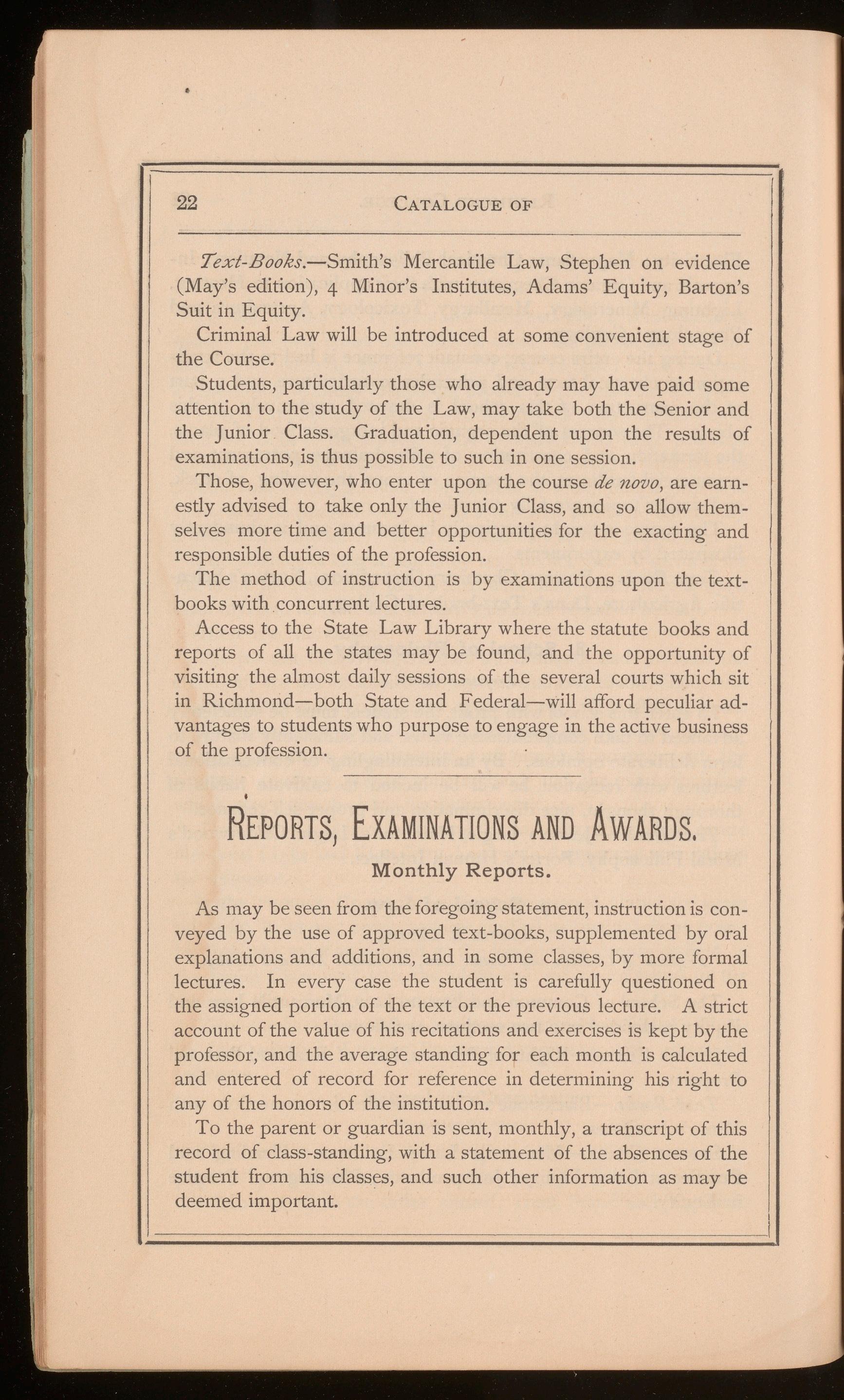
CATALOGUE OF
Te.xt-Books.-Smith's Mercantile Law, Stephen on evidence (May's edition), 4 Minor's Institutes, Adams' Equity, Barton's Suit in Equity.
Criminal Law will be introduced at some convenient stage of the Course.
Students, particularly those who already may have paid some attention to the study of the Law, may take both the Senior and the Junior Class. Graduation, dependent upon the results of examinations, is thus possible to such in one session.
Those, however, who enter upon the course de novo, are earnestly advised to take only the Junior Class, and so allow themselves more time and better opportunities for the exacting and responsible duties of the profession.
The method of instruction is by examinations upon the textbooks with _concurrent lectures.
Access to the State Law Library where the statute books and reports of all the states may be found, and the opportunity of visiting the almost daily sessions of the several courts which sit in Richmond-both State and Federal-will afford peculiar advantages to students who purpose to engage in the active business of the profession.
As may be seen from the foregoing statement, instruction is conveyed by the use of approved text-books, supplemented by oral explanations and additions, and in some classes, by more formal lectures. In every case the student is carefully questioned on the assigned portion of the text or the previous lecture. A strict account of the value of his recitations and exercises is kept by the professor, and the average standing for each month is calculated and entered of record for reference in determining his right to any of the honors of the institution.
To the parent or guardian is sent, monthly, a transcript of this record of class-standing, with a statement of the absences of the student from his classes, and such other information as may be deemed important. I

The object of these reports is mainly to enlist the active interest of friends in the progress of the student, with a view to such encouragement or admonition as the case may need. By the prompt and judicious attention of those to whom they are addressed, these reports may be made of great value in promoting · improvement and sustaining a jus~ discipline.
Besides the daily questioning, every class is subjected to two general examinations, conducted in writing. The Intermediate Examination, embracing in its scope the first half of the course, is held about the middle of the session. The Final Examination, held near the close of the session, embraces the subjects treated in the second half. In senior classes, however, examinations are not limited to what has been explicitly contained in the course of instruction, but may embrace as well, passages that have not been read, or problems that have not been solved in the class-room, together with an oral review of the whole course taught in the school, as searching and extensive as the professor may deem necessary.
For the general examinations a series of questions, to which certain numerical values are attached, in proportion to their relative importance, is prepared for each class. After the examinations the answers furnished by each student are carefully valued, and this valuation is equitably combined with the average of his class-standing for the half session next preceding the examination. If the standing of a student as thus ascertained amount to eighty per centum, he is ranked in the first division; if to less than eighty, but not less than fifty per centum, in the second division; if to less than fifty, in the third or lowest division.
Students who attain to the second division, in Junior or Interm ediate Classes, will be allowed to pass on to the class above.
Certificates of Distinction are awarded to those who attain the first division at eith er of the Examinations, and their names are published or announced in the closing exercises of the session.
Certificates of Promotion are awarded to those who attain the first division at both Examinations, in Junior or Intermediate Classes.
Certificates of Proficiency are conferred on those who attain

the first division in certain complete subjects of study, to wit: in French, in German, in Surveying, in Junior Physics and in Mineralogy and Geology.
Scllool Diplomas are conferred on those who attain the first division in examinations covering the leading subjects taught in each School, to wit: the Latin Language and Literature and Roman History; the Greek Language, History and Literature; two Modern Languages; the English Language and Literature; Mathematics; Physics; Chemistry and Philosophy.
The results of examinations are communicated to parents or guardians in the report for the month of June. Medals.
I. THE Woons MEDAL.-Hiram Woods, E sq., of Baltimore, has founded a prize, consisting of a gold medal, which is awarded for excellence in Declamation.
II. THE FRANCIS GWIN MEDAL.-A valuable gold medal, founded by Rev. D. W. Gwinn, D. D., in memory of his mother, is annually given to the most meritorious student in the School of Philosophy.
III. THE STEEL MEDAL.-Dr. George B. Steel, of Richmond, has founded a gold medal, which is given, under direction of the Faculty, to the best Reader.
The Academic Degrees conferred by the Trustees, on the recommendation of the Faculty, are the following:
I. That of BACHELOROF LITERATURE on such students as have obtained Diplomas in the Schools of Latin, Greek and English, a Certificate of Proficiency in one Modern Language, and Distinctions in the Junior Classes of Mathematics, Physics (or Chemistry), and Philosophy.
2. That of BACHELOROF SCIENCEon such students as have obtained Diplomas in the Schools of Mathematics, Physics and Chemistry, a Certificate of Proficiency in one Modern Language, a Promotion in the Intermediate Class of English, and distinctions in the Junior Classes of Latin and Philosophy.
3. That of BACHELOROF LAW-conferred upon students who have passed satisfactory examinations in the classes of the Law School.
4. That of BACHELOROF ARTS on such students as have obtained Diplomas in the five Schools of Latin, Greek ( or Modern

Languages), English, Chemistry (or Physics), and Philosophy, and Promotion in the Intermediate Class of Mathematics.
5. That of MASTER OF ARTS on such students as have obtained Diplomas in all of the eight academic schools, and have passed satisfactory general examinations in review on all the subjects embraced therein.
The Candidate for either of the degrees in Arts is also required to submit for the approval of the Faculty an oration or essay composed by himself, which he shall deliver in public at the close of the session, if so directed.
Entrance Fees.-Matriculation, &c., $15; room rent, if the room is occupied by one student, $7.50, if by two, $5 each. These fees are payable on matriculation, not subject to deduction, nor in any case refunded.
Tuition.-In one school, $50; in two, $60; in three, $70; in four or more, $20 for each. One-half of this sum is payable September 20th, the rest February 4th, subject to deduction for time lost by late entrance or by sickness, if the time so lost be onefourth or more of the whole session.
Fuel is furnished at cost. Rooms in the main building, occupied by two students, will be warmed at a cost of $10 to each occupant, payable on matriculatioq.
Board.-Payable monthly in advance at the College hotel, $13; in private families, from $12 to $18; in messing clubs, about $9, which also can be paid in provisions as well as in money.
Messing.
The plan of forming messing clubs was introduced at this Institution in 1866, and has been since adopted by many others. Each club controls its own bill of fare, appointing one of its number to purchase supplies, preside at meals, and divide the expenses equally among the members, crediting each with the estimated value or" any provisions furnished by him. During the present session, under the skilful management of Mrs. Woolfolk, who is retained for next session, abundant, well-served fare has been fur-
CATALOGUE OF
nished, at an average cost of $9.II per month. The plan is giving, in all respects, entire satisfaction.
Lights and Washing cost about $2, or, if gas be used, $3 a month.
I. FOR A STUDENT RESIDENT AT THE COLLEGE.
Entrance Fees, Tuition in three schools (the usual number), Board in messing clubs, about Fuel $10, lights and washing $18, Mess Hall, &c., -
Total expenses for entire session, Or, by boarding instead of messing, Tuition in the School of Law,
Of this amount about $85 will be needed on entrance, $35 February 4th, and the rest at intervals through the session.
2. FOR A NON-RESIDENT STUDENT Entrance

Of this amount $50 are payable September 20th; $35 February 4th. If, for study during the day, a non-resident student is assigned to a room already occupied by resident students, he is charged $2.50 to cover expenses of fuel. If a room is occupied exclusively by non-resident s1:udents, each is charged $2.50 for room rent and $5 for fuel.
Contingent Deposit.-Resident students are required to deposit with the Treasurer $5, and non-resident students $2.50, to cover any damage done to College property and any Library fines. At the end of the session this money, or such portion as the depositor may be entitled to, is returned.
The occupants of each dormitory supply the necessary furniture. If the bedding, towels, &c., be brought from home, the outlay for furniture need not exceed $6 apiece, and the articles bought here can readily be sold again on leaving College.
Privileged Students.-Ministers of the Gospel of all denominations, and young men duly approved by their churches as candi-

dates for the ministry, are admitted free of all college fees except a charge of $ro, and, if they board in the messing club, a fee of $4 for rent of Mess Hall. The Education Board of the Virginia Baptist General Association, located in Richmond, but in no other way connected with the College, will render further assistance to young men recommended to them and accepted after examination.
On the last day of the session the closing exercises are held in public, when the results of the examinations are announced, certificates and diplomas awarded, and addresses delivered by the Bachelors and Masters of Arts.
The order of announcement and delivery of honors is as follows:
r. Announcement of Distinctions in the various Classes.
2. Announcement of Promotions in the Junior Classes.
3. Delivery of Certificates of Promotion in Intermediate Classes.
4. Delivery of Certificates of Proficiency.
5. Delivery of School Diplomas.
6. Delivery of Degree Diplomas Medalists, 1878.
The medals were, the last session, awarded as follows:
The Woods Meda/to F. P. Robertson , Albemarle county, Va.
The Francis Gwin M edal to C. W. Coleman, Jr., Hanover county, Va.
The Steel Medal to Ashton Starke, Richmond, Va.
Titled Graduates, Session 1877-78.
Baclielors of Law.-Howard R. Bayne, Richmond, Va.
Sol. Cutchins,"Nansemond county, Va.
O. H. P. Garrett, Texas.
George J. Hooper, Richmond, Va.,
James Lyons, Richmond, Va.
L. M. Nance, Charles City county, Va.
F. T. West, Louisa county, Va.
Harvey Wilson, Richmond, Va.
Baclielors of Arts.-R. E. Glover, Richmond, Va.
M.A. Turner, Richmond, Va.
28

CATALOGUE OF
Masters of Arts.-Edward H. Hartenstein, Warrenton, Va. Chas. W. Coleman, Hanover Co., Va.
Wm. F. Harris, New Kent county, Va. Armistead R. Long, Pennsylvania. George W. Riggan, Isle of Wight, Va.
Literary Societies.
The two Literary Societies meet every week for debate, declamation, and other literary exercises. They are enthusiastically maintained, and, by offering medals for eminent ability and improvement, excite a generous emulation productive of very bene- ficial results. Their libraries contain 2,000 volumes.
Final Celebration, 1878.
MU SIGMA RHO SOCIETY. PHILOLOGIAN SOCIETY. MEDALISTS. MEDALISTS.
J. Wm. Boyd, Best Debater. W. T. Derieux. Best Debater. G. W. Riggan, Best Writer. F. P. Robertson, Best Writer. P. Y. Tupper, Best Reader. George Wm. Cone, Best Reader. R. H. Pitt, Best Declaimer. T. W. T. Noland, Best Declaimer. G. C. Abbitt, Improvement in Debate. L. M. Nance, Improvement in Debate. ORATOR. ORATOR.
Howard R. Bayne, Richmond, Va. Geo. W. Riggan, Isle of Wight, Va. SALUTATORIAN. VALEDICTORIAN.
Paul Y. Tupper, Richmond, Va. F. P. Robertson, Albemarle Co., Va.
Consists of those who have received any of the College degrees, and such other former students as may be, for distinguished merit, elected to membership. They meet annually in connection with the closing exercises of the .session, to renew the Associations of College life, and to promote the interests of their Alma Mater. An address by an Alumnus of the College is delivered on these occasions. The officers are:
Rev. Wm. E. Hatcher, D. D., president; Rev. S. C. Clopton, secretary; H. R. Bayne, Esq., treasurer.
Executive Committee.-J. Taylor Ellyson, Esq., B. T. Davies, Esq., H. R. Bayne, Esq., Norval Ryland, Esq., and Jas. Lyons, Jr., Esq. Orator for I878.-Morton B. Howell, Esq., Nashville, Tenn.
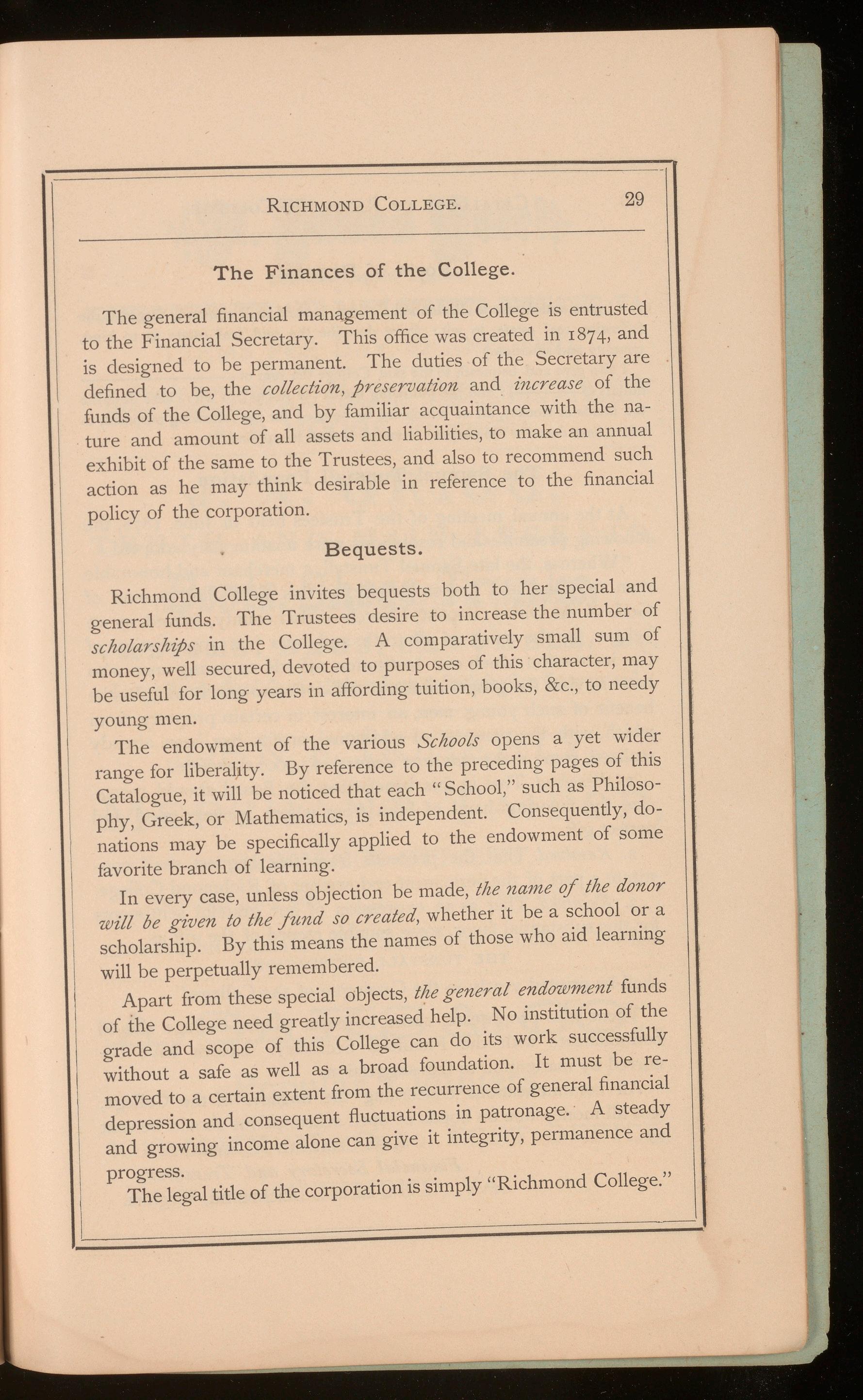
The general financial management of the College is entrusted to the Financial Secretary. This office was created in 1874, and is designed to be permanent. The duties of the Secretary are defined to be, the collection, preservation and increase of the funds of the College, and by familiar acquaintance with the nature and amount of all assets and liabilities, to make an annual exhibit of the same to the Trustees, and also to recommend such action as he may think desirable in reference to the financial policy of the corporation.
Richmond College invites bequests both to her special and general funds. The Trustees desire to increase the number of sclzolarskips in the College. A comparatively small sum of money, well secured, devoted to purposes of this character, may be useful for long years in affording tuition, books, &c., to needy young men.
The endowment of the various Schools opens a yet wider range for liberality. By reference to the preceding pages of this Catalogue, it will be noticed that each "School," such as Philosophy, Greek, or Mathematics, is independent. Consequently, donations may be specifically applied to the endowment of some favorite branch of learning.
In every case, unless objection be made, t!te name o.f the donor will be given to t!te fund so created, whether it be a school or a scholarship. By this means the names of those who aid learning will be perpetually remembered.
Apart from these special objects, t!te general endowment funds of the College need greatly increased help. No institution of the grade and scope of this College can do its work successfully without a safe as well as a broad foundation. It must be removed to a certain extent from the recurrence of general financial depression and consequent fluctuations in patronage. A steady and growing income alone can give it integrity, permanence and progress. The legal title of the corporation is simply "Richmond College."

" I give and devise to Richmond College, located in Richmond, Virginia, the following real estate, to wit: (here describe the said real estate as to kind, quantity and situation.)
I also give and bequeath to the said College the sum of---------dollars ($---); and the following bonds (or stocks), to wit: (here describe the bonds or stocks), all of which are to be used for the following purposes, to wit: (here describe the purpose to which it shall be applied.'')
The Samuel Tunstall Foundation.
At the annual meeting of the Trustees held in June, 1878, the following preamble and resolutions were unanimoµsly adopted:
"Whereas, the late Samuel Tunstall, a merchant and honorable man of King and Queen county, of this State, and a man of God, of the Olivet (Baptist) Church of that county, moved, as we believe, by the spirit of all truth, and by a just appreciation of the instruction which our Institution affords to young men who have in view the gospel ministry, did devise to our Board, for the benefit of such young men, an interest in certain property, from which, with the prospect of additional profits, has been already realized, some seven thousand dollars ($7 ,ooo) therefore,
r. Resolved, That in this benefaction the Board should recognize the favoring hand of Him from whom is every good and perfect gift.
2. Resolved, That the proceeds from this bequest shall constitute a part of the permanent endowment of Richmond College.
3. Resolved, That as an expression of our grateful sentiments for this substantial favor, some suitable record of the gift as
THE TUNSTALLFOUNDATION, shall be printed yearly in the Catalogue of the College."
Those who propose to make bequests to the College should communicate with the Financial Secretary. Losses have occurred by inattention to this suggestion.
All communications concerning the finances of the College, and all money due on bonds or open subscriptions should be sent to Rev. CHARLES H. RYLAND, Financial Secretary and Treasurer, Richmond, Virginia.
Opposite Capitol Square, .
CORNERTWELFTHANDBANKSTREETS,RICHMOND,VA.
TERMS PER DAY, $2 AND $2.50.
This House is mo st centrally located, being within three squares of either of the Depots, Tobacco Exchange or Warehouses. First-Class Table and Rooms. A. B. MOORE, Proprietor.

TENTH AND MAIN STREETS, r§oots,§hoes,®runks, VALISES, BAGS, SATCHELS, &c.
LargeStock,GoodGoods,PricesLow& SatisfactionGuaranteed.
and
JOHNWANAMAKER, Fine Clothing and u~nishing Goods,
TENTH&N~INSTREETS,RICH~OND 1 VA.
LARGEST AND CHEAPEST STOCK IN VIRGINIA. BRANCH OF OAK HALL, PHILADELPHIA.
SPECIAL ATTENTION GIVEN TO OUR MERCHANT TAILORING DEPARTMENT.
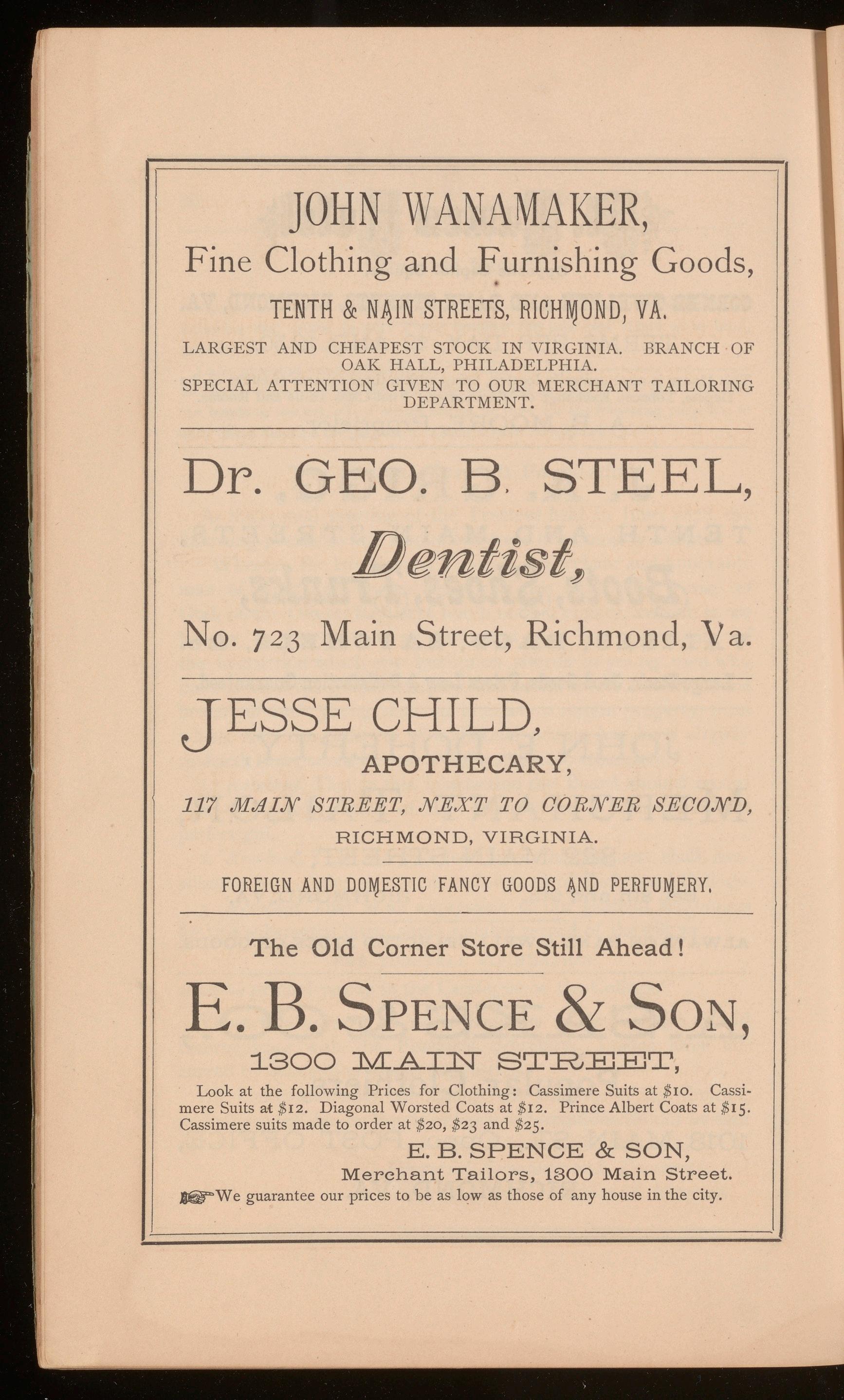
No. 7 2 3 Main Street, Richmond, Va. JESSE CHILD, APOTHECARY,
117 MAIN STREET, NEXT TO CORNER SECOND, RICHMOND, VIRGINIA. FOREIGNANDD0riJESTICFANCYGOODS~NDPERFU~ERY, The Old Corner Store Still Ahead ! E. B. SPENCE & SoN, 1300 :::tY-CAIN STREET, Look at the following Prices for Clothing: Cassimere Suits at $ 10. Cassimere Suits at $12. Diagonal Worsted Coats at $12. Prince Albert Coats at $ 15. Cassimere suits made to order at $20, $23 and $25. E. B. SPENCE & SON, Merchant Tailors, 1300 Main Street. 'flliB"We guarantee our prices to be as low as those of any house in the city.

JOSIAH RYLAND. R. B. LEE. JOSIAHRYLAND & CO.,
(Successorsto STARKE& RYL~ND)
Booksellers 1 StatioQersandPriQters 1
918 MAIN ST., RICHMOND, Va., Wholesale and Retail Dealers in SCHOOL BOOKS OF ALL . KINDS, Cap,Letter,BillandNotePaper,Envelopes,
BLANK BOOKS OF EVERY VARIETY. FAMILY BIBLES, POCKET, BIBLES, PHOTO• GRAPH ALBUMS, AND FANCY ARTICLES GENERALLY. PIANOS AND ORGANS, ALSO SUNDAY SCHOOL BOOKS,
Such as Libraries, Question Books, Tickets, &c. · Special Discount to Ministers and Ministerial Students.
WM G. TAYLOR, President. JOHN C. WILLIAMS,Cashier.
1111 ~AIN STREET, RICHMOND, VIRGINIA.
This Bank, organized under a charter granted by the State, is prepared to transact General Banking Business. Prompt atterition given to Collections on all accessible points. The patronage and correspondence of banks, bankers and the public are solicited.
Virginia Securities funded under Act of March 28, I 879, on same terms as the Funding Association.
WM. G. TAYLOR, F. T. GLASGOW, DIRECTORS. A. S BUFORD; JOHN C. WILLIAMS. JOSIAH RYLAND,
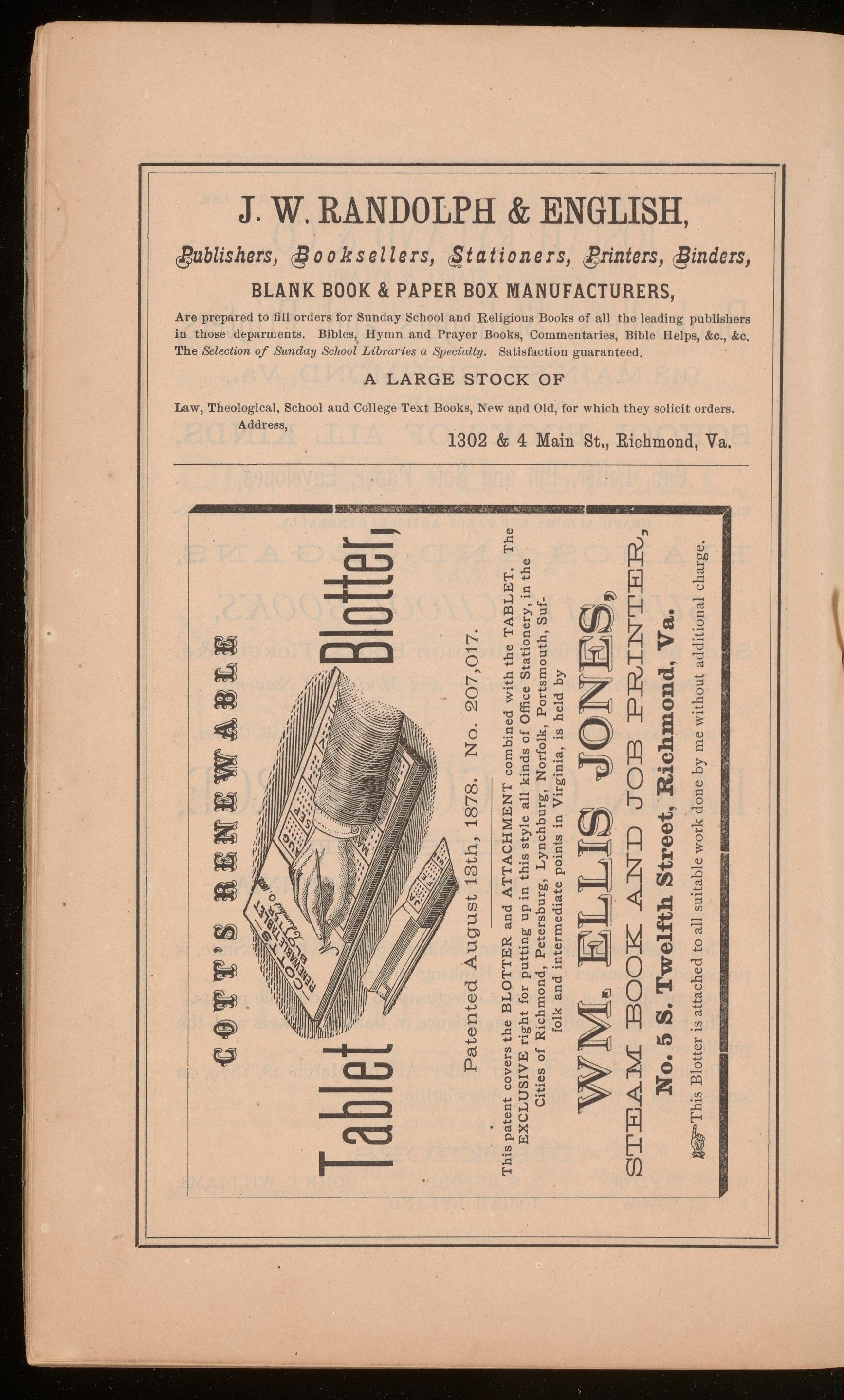
<!1ublishers,c@ooksellers, §tationers, <!1rinters,c@inders,
BLANKBOOK& PAPERBOXMANUFACTURERS, Are prepared to fill orders for Sunday School and R e ligious Books of all the leading publishers in those deparrnents. Bibl es, llymn and Prayer Books, Commentari es, Bible Helps, &c., &c. The &lection of Sunday School Libraries a Sp ecialty. Satisfaction guaranteed.
A LARGE STOCK OF
Law, Theological, School aud College Text Books, New and Old, for which they solicit orders. Address, 1302 & 4 Main St., Richmond, Va.
